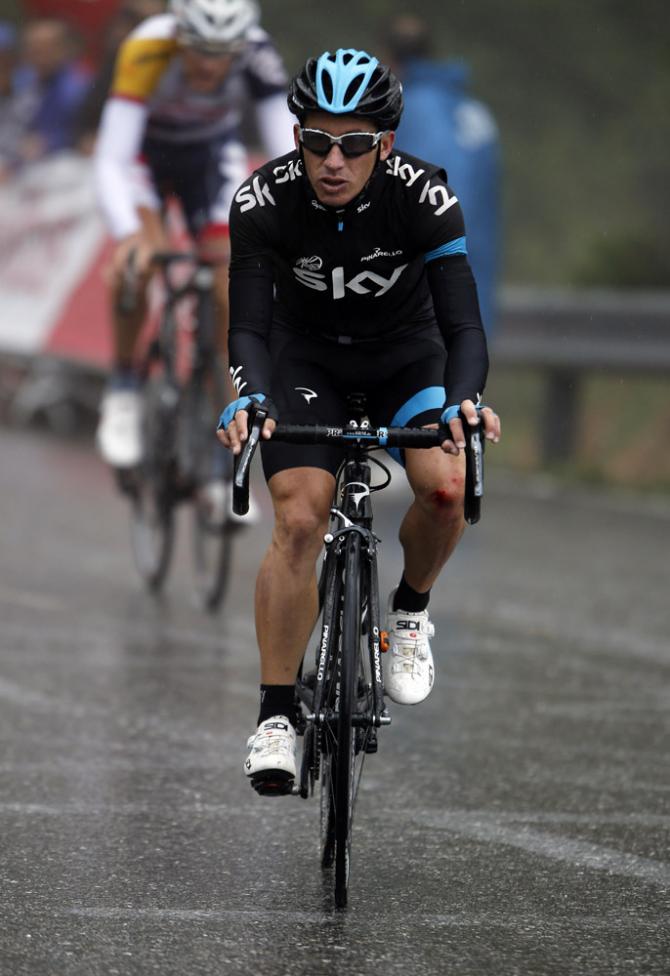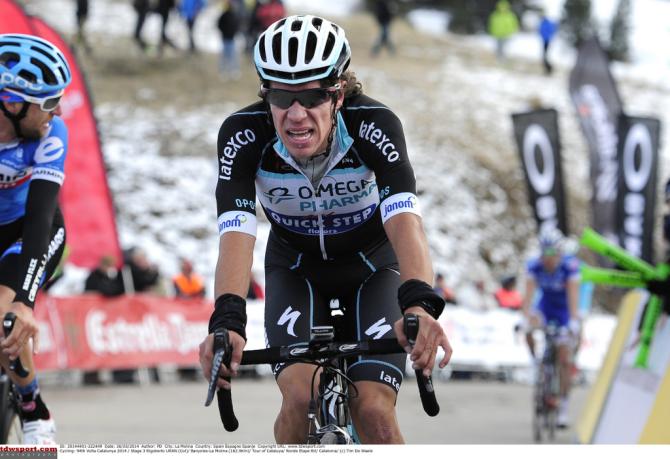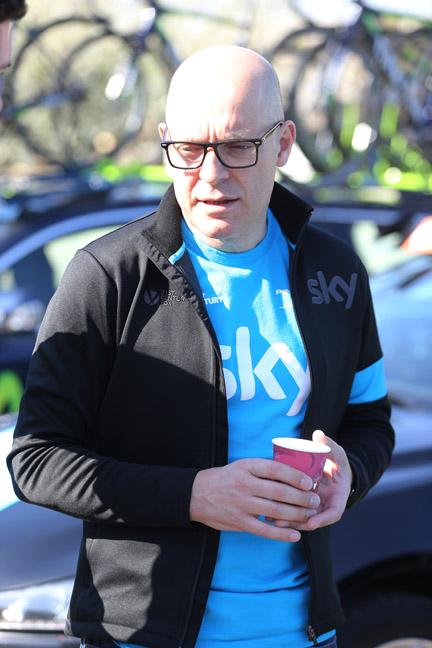Does Colombia's anti-doping stand up to scrutiny?
No out of competition blood tests until October 2013



The thoroughness of out-of-competition doping controls has once again been put under the microscope after Cyclingnews learned that, until the winter of 2013, Colombian professional cyclists were not subject to out-of-competition blood tests while in their native country. This includes Team Sky's Sergio Henao and Omega Pharma QuickStep's Rigoberto Uran, with both riders only having their first tests of this nature in October 2013.
Henao recently made headlines after Team Sky confirmed that the rider had been removed from racing due to questionable readings within his biological passport. He is set to undergo further tests via a party chosen by Sky and independent of the CADF's biological passport.
Henao's questionable readings came from two out-of-competition tests carried out during the off-season, the first of which took place on October 30 of last year, while the second reading was taken on January 14, 2014. It is the second reading from January that led Sky to ask questions. Sky, like all WorldTour teams, have access to rider data via ADAMS.
After Sky confirmed to the media that Henao had been benched pending further tests, Cyclingnews contacted the UCI. The sport's governing body confirmed that Henao had only undergone two out-of-competition blood tests in Colombia during his entire time at Sky, and when asked whether Rigoberto Uran had a similar profile, the UCI confirmed that the Omega Pharma rider had also undergone two tests.
Uran signed for Sky in 2011 and rode for the British team until the end of 2013. He finished second in last year's Giro d'Italia before signing for Patrick Lefevere's Omega Pharma team and is expected to challenge for overall honours in the Giro again this year. He has been part of the biological passport since its inception but his only two out-of-competition blood tests came on October 30 2013, and on January 1, 2014.
All teams that are part of the biological passport have access to every test a rider has done, all the way back to the biological passport's inception in 2008. There is roughly a two-week window in which the tests are taken and then made available to the respective teams. A team can then, for example, ask the UCI to provide an update on which of its riders have been tested, and how often they have been tested. The UCI will then provide the requested information via the CADF, which has run the biological passport programme since the tail end of 2013.
At Sky, there is an internal review panel in which four individuals sift through the data and decide if any of the new information needs further scrutiny. The team also has external experts who can then analyse test results. Although the team has access to test data, it is not privy to whether the test results are valid or if a test has been flagged up by the CADF's passport panel either for targeted testing or as a violation.
Get The Leadout Newsletter
The latest race content, interviews, features, reviews and expert buying guides, direct to your inbox!
The lack of testing in Colombia
Henao and Uran are not unique cases. The Colombian anti-doping organisation, COLDEPORTES (El Departamento Administrativo del Deporte, la Recreación, la Actividad Física y el Aprovechamiento del Tiempo Libre), only came into being in 2011, and the only WADA-accredited lab capable of testing blood in Colombia is in Bogotá.
Up until 2012 there had been no out-of-competition blood testing at the lab, although urine tests - which can detect EPO - were carried out. In April 2013, the lab was given accreditation to test blood.
For blood tests, there is a 48-hour window in which blood must be analysed once drawn from a rider. There is also a strict level of protocol involving transport, so in remote locations of Colombia, it's simply not feasible for blood to simply be flown from altitude to labs as it might be, for example, the United States.
Cyclingnews spoke to journalist Matt Rendell, a leading authority on cycling in Colombia. He explained that the anti-doping movement within Colombia was still in its infancy and that there had been a number of hurdles and challenges in the last few years. He added that the country’s fight for cleaner sport had shown signs of growth.
“As in many countries, anti-doping in Colombia has two quite distinct facets. On the one hand, the involvement in cycling of doping doctors like Alberto Beltrán who, a few years ago, came dangerously close to becoming to head of sports medicine in the country, which would no doubt have led to the creation of a national doping programme, like Conconi's in Italy in the 1980s and 1990s.
“On the other hand, there is an institution like the national team Colombia Es Pasión, now 472-Colombia, which has funded its own biological passport programme since September 2008, at great expense, not least because the UCI could provide no infrastructure whatsoever in South America. Colombia Es Pasión were also pioneers in introducing a no needles policy, too."
Henao came up through the Colombia Es Pasión team.
“On 6 March this year, after much lobbying, 472-Colombia was joined by two other Colombian teams, Orgullo Antioqueño and GW, who sign a pact called 'Por un ciclismo ético,' part-internal testing, part agreement à la Movement for an Ethical Cycling. In future, more national teams may join the pact.
“So, in some respects, Colombian anti-doping is playing catch-up, due to a lack of structures and, of course, limited funding. And we have to admit that OOC testing in the developed world seems to have been going backwards over recent years.”
Cyclingnews also contacted Team Sky's Dave Brailsford in regard to Henao and Uran. Sky has tried to position themselves as a clean team within the sport and when asked if the team were concerned with signing Colombian riders when there had been consistent gaps in the passport testing, Brailsford told Cyclingnews, "There's also a pattern of in competition tests so you have bear that in mind. They're being tested all the way through races, throughout the season, so that gives you an idea over the natural physiology of a rider. You still have a substantial amount of information."
Brailsford added that he welcomed the development in Colombia and that the WADA-accredited lab was now up to speed on out of competition blood tests but he added that, 'Henao's not done anything wrong at the moment. What we're saying is that there's new information based off new tests that haven't been done before which we would like to understand.
"There's no positive test and we'd just like to understand [that data]. We were left with three choices. One was let him carry on and then see whether in seven months' time he gets a letter from the UCI or not, we could stop him totally and say we're not happy with the situation but because it's new information that would be very harsh. So we decided on a third option where we try and find new a approach but it's a very difficult situation."
Cyclingnews also contacted Omega Pharma-QuickStep with the team stating that they had faith in Uran and that the rider had undergone tests throughout last season, both in and out of competition. They added that they had looked at Uran's passport data and were satisfied with the results.
Around the World
For a greater sense of a global perspective there were a total of 4,352 bio passport out-of-competition blood tests in 2012 in cycling with 3,262 of those directly coming from the UCI. Compare Colombia's lack of tests with Spain's national federation, who conducted just three tests in the same period and one can ascertain that out-of-competition blood tests are well below the in-competition number. For reference the Republic of Ireland carried out 30 blood tests out of competition in 2012, USADA did 62, and Russia 128.
Cyclingnews spoke to one Tour de France contender who said that he was tested once during the last off-season, with that test taken while he was training in Europe. He was also tested in September and January, before his first race of the season.
“The explanation for Henao's predicament could, we have to remember, prove entirely innocent,” Rendell added.
“If so, it is to be hoped that the sport, its sponsors and its fans will be sophisticated enough to understand that sports physiology, especially connected with altitude, is, even today, very far from being omniscient.”
Daniel Benson was the Editor in Chief at Cyclingnews.com between 2008 and 2022. Based in the UK, he joined the Cyclingnews team in 2008 as the site's first UK-based Managing Editor. In that time, he reported on over a dozen editions of the Tour de France, several World Championships, the Tour Down Under, Spring Classics, and the London 2012 Olympic Games. With the help of the excellent editorial team, he ran the coverage on Cyclingnews and has interviewed leading figures in the sport including UCI Presidents and Tour de France winners.
